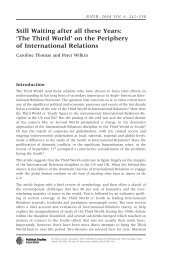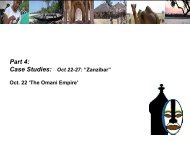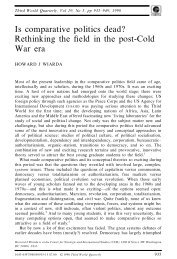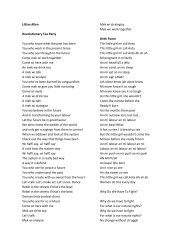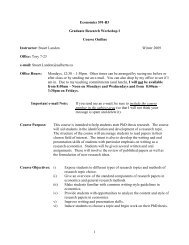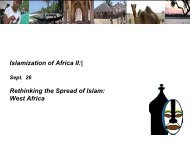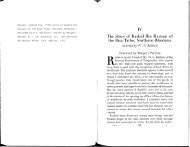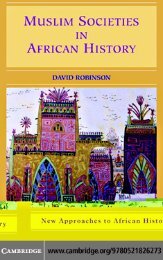personal memories revolutionary states and indian ocean migrations
personal memories revolutionary states and indian ocean migrations
personal memories revolutionary states and indian ocean migrations
You also want an ePaper? Increase the reach of your titles
YUMPU automatically turns print PDFs into web optimized ePapers that Google loves.
Omani elite was exposed to that trend since its inception <strong>and</strong> the Sultans of<br />
Zanzibar were financially assisting several of its vanguards.<br />
One of those Arabists with whom Omanis frequently corresponded was<br />
Jurjī Zaydān (1861-1914), an icon of this Arab nahḍa, “who did more than any other<br />
to create a consciousness of the Arab past”. 61 He was the editor of the Egyptianbased<br />
journal al-Hilāl --a journal that enjoyed wide circulation among the Zanzibari<br />
elite-- <strong>and</strong> author of many short stories <strong>and</strong> books, including Tārīkh al-adab al-islāmī,<br />
a popular book in Zanzibar. 62 He communicated regularly with Sultans Ḥamūd <strong>and</strong><br />
‘Alī, <strong>and</strong> his correspondence consisted primarily of formalities, notification to<br />
renew subscription, replies to requests, etc… Zaydān’s interest in Zanzibar,<br />
however, is noteworthy. It is testimony that for him, Zanzibar, despite geography,<br />
was part of the Mashriq <strong>and</strong> politically <strong>and</strong> ideologically integrated into the larger<br />
Arab world. Its Sultans were Arab <strong>and</strong> thus they symbolized the Arab ‘heroism’ that<br />
Zaydān was seeking. Perhaps, it is that same ‘heroism’ that prompted Nāṣir al-<br />
Lamkī to send al-Hilāl a biography of the Omani adventurer Ḥamīd al-Marjibī,<br />
otherwise known as Tippu Tip. 63 The piece focused on al-Marjibī’s adventures in<br />
Central Africa <strong>and</strong> his role in exp<strong>and</strong>ing Omani rule in this largely unknown<br />
territory. The introduction to the article in al-Hilāl, presumably written by Zaydān<br />
himself, was even more interesting than the article. The editor presented al-Marjibī<br />
as an Arab hero from among “the geniuses of the Sharq [East]…who performed<br />
miracles in politics, in prudence <strong>and</strong> in leadership”, 64 <strong>and</strong> whose efforts to discover<br />
the interior of Africa must be revealed to all. 65<br />
The editor ended his introduction by thanking al-Lamkī for “his earnest<br />
concern to make known the achievements of the Sharqiyyīn [Easterners].” 66 During<br />
a period of Arab self-glorification <strong>and</strong> resurrection of a celebrated past, it is very<br />
significant that Zaydān chose Zanzibar to represent that history, <strong>and</strong> to remind the<br />
Arab world of that golden moment when history witnessed the expansion of Arab<br />
rule in Africa. Al-Marjibī’s achievements in East Africa, in Zaydān’s eyes, were Arab<br />
‘heroic’ achievements worth placing al-Marjibī among the greatest ‘celebrities’<br />
Zaydān listed in his Mashāhīr al-sharq, 67 <strong>and</strong> among those who helped build the Arab<br />
legacy.<br />
Zaydān was not the only writer of the avant-garde of the Arab nahḍa to<br />
seek <strong>and</strong> receive the support of the Sultans. Ibrāhīm Nāṣīf al-Yāzijī (1847-1906), a<br />
Christian Arab who believed that “[t]he Easterners, or at least the Arabs, instead of<br />
being inferior to the Europeans, were the most remarkable of people, a people who<br />
had civilized the West,” 68 was in touch with them as well. His famous work Nuj‘at<br />
al-rā’id (The Hope of the Seeker) 69 was published with the full support of Sultan<br />
‘Alī. 70<br />
Those Arabs, though not Muslims, converged with Salafis on the need to<br />
highlight the splendor of the early history of Islam <strong>and</strong> to assert that Arabs were<br />
capable again of reincarnating that history. Much of their discourse, like that of<br />
Salafis, was geared toward underscoring the presence of a full-fledged Arab<br />
civilization long before the European one. The involvement of the Omani elite in<br />
Zanzibar in this cultural renaissance of Arabs reflects their interest in the<br />
resurrection of the Arab heritage for the sake of promoting the legacy of Islam. It<br />
also reflects their awareness of their role as ‘Arabs’ in encouraging all efforts that<br />
aim at cherishing Arab history <strong>and</strong> the Arabic language.<br />
http://web.mit.edu/cis/www/mitejmes/<br />
51





